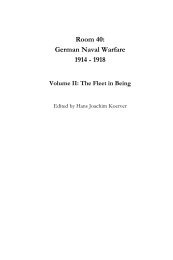German Submarine Warfare 1914-1918 in the Eyes - British Naval ...
German Submarine Warfare 1914-1918 in the Eyes - British Naval ...
German Submarine Warfare 1914-1918 in the Eyes - British Naval ...
Create successful ePaper yourself
Turn your PDF publications into a flip-book with our unique Google optimized e-Paper software.
Imperial Navy optimism was not entirely ill-founded.<br />
66 NA, ADM 116/3421, p. 280.<br />
67 NA, ADM 116/3421, p. 281.<br />
68 Salter, Allied Shipp<strong>in</strong>g Control, p. 122.<br />
69 Churchill, World Crisis, p. 719.<br />
70 Still, Crisis, pp. 16-17.<br />
71 Ibid. pp. 177-178.<br />
xxxiv<br />
Initial success <strong>in</strong> Spr<strong>in</strong>g 1917<br />
Recognition of submar<strong>in</strong>e effectiveness could also be found <strong>in</strong> Brita<strong>in</strong>. In<br />
October, 1916 when restricted submar<strong>in</strong>e warfare resumed, Jellicoe wrote to <strong>the</strong><br />
Admiralty that <strong>the</strong>re was “a serious danger that our losses <strong>in</strong> merchant ships, comb<strong>in</strong>ed with<br />
<strong>the</strong> losses <strong>in</strong> neutral merchant ships, may by <strong>the</strong> early summer of 1917, have such a serious effect<br />
upon <strong>the</strong> import of food and o<strong>the</strong>r necessaries <strong>in</strong>to <strong>the</strong> allied countries, as to force us <strong>in</strong>to accept<strong>in</strong>g<br />
peace terms which <strong>the</strong> military position on <strong>the</strong> Cont<strong>in</strong>ent would not justify, and which would fall<br />
far short of our desires.” 66 In November, 1916 <strong>the</strong> Admiralty <strong>in</strong>formed His Majesty’s<br />
government of <strong>the</strong> U-boat menace that “No conclusive answer has as yet been found to this<br />
form of warfare; perhaps no conclusive answer ever will be found. We must for <strong>the</strong> present be<br />
content with palliation.” 67 The alarm heightened <strong>in</strong> April, 1917: “In a s<strong>in</strong>gle fortnight <strong>in</strong><br />
April, 122 ocean-go<strong>in</strong>g vessels were lost. The rate of <strong>British</strong> loss <strong>in</strong> ocean-go<strong>in</strong>g tonnage dur<strong>in</strong>g this<br />
fortnight was equivalent to an average round-voyage loss of 25% percent – one out of every four<br />
ships leav<strong>in</strong>g <strong>the</strong> United K<strong>in</strong>gdom for an overseas voyage was lost before its return. The<br />
cont<strong>in</strong>uance [at] this rate . . . would have brought disaster upon all Allied campaigns, and might<br />
well have <strong>in</strong>volved an unconditional surrender.” 68 Admiral Lord Fisher was prompted to<br />
ask “Can <strong>the</strong> Army w<strong>in</strong> <strong>the</strong> war before <strong>the</strong> Navy loses it?” 69<br />
Churchill recorded a conversation between American Admiral Sims and<br />
Admiral Jellicoe:<br />
Sims: “It looks as though <strong>the</strong> <strong>German</strong>s [are] w<strong>in</strong>n<strong>in</strong>g”<br />
Jellicoe: “They will w<strong>in</strong>, unless we can stop <strong>the</strong>se losses – and stop <strong>the</strong>m soon.” 70<br />
The threat extended to <strong>the</strong> Grand Fleet: “By <strong>the</strong> outbreak of <strong>the</strong> war <strong>in</strong> <strong>1914</strong>, 45%<br />
percent of <strong>the</strong> <strong>British</strong> fleet burned oil, <strong>in</strong>clud<strong>in</strong>g nearly all <strong>the</strong> destroyers. The <strong>British</strong> Navy’s<br />
monthly oil requirement jumped from 80,500 tons <strong>in</strong> January, 1915 to 190,000 two years later .<br />
. . Tanker losses to U-boats fur<strong>the</strong>r lowered <strong>the</strong> oil supply. ‘As demands went up, tankers went<br />
down.’ Fuel oil stores were so low <strong>in</strong> February, 1917 that Lord Curzon admitted, ‘<strong>the</strong> Fleet had<br />
to restrict its exercises.’ In June, <strong>the</strong> Commander-<strong>in</strong>-Chief, Grand Fleet, was <strong>in</strong>formed that <strong>the</strong> oil<br />
situation was ‘most critical’, that all oil-burn<strong>in</strong>g vessels ‘except <strong>in</strong> great emergency were to be<br />
limited to three-fifths power.’ In July, <strong>British</strong> foreign secretary Lord Arthur Balfour cabled . . .<br />
that unless three hundred thousands tons of fuel oil could reach Brita<strong>in</strong>, immobilization of <strong>the</strong><br />
<strong>British</strong> Fleet was threatened.” 71<br />
U-boats, <strong>in</strong>deed, were br<strong>in</strong>g<strong>in</strong>g Brita<strong>in</strong> to ru<strong>in</strong>.




